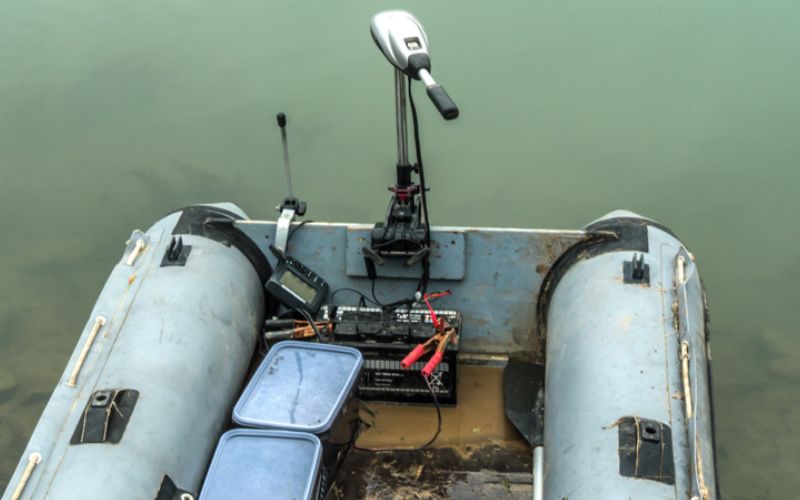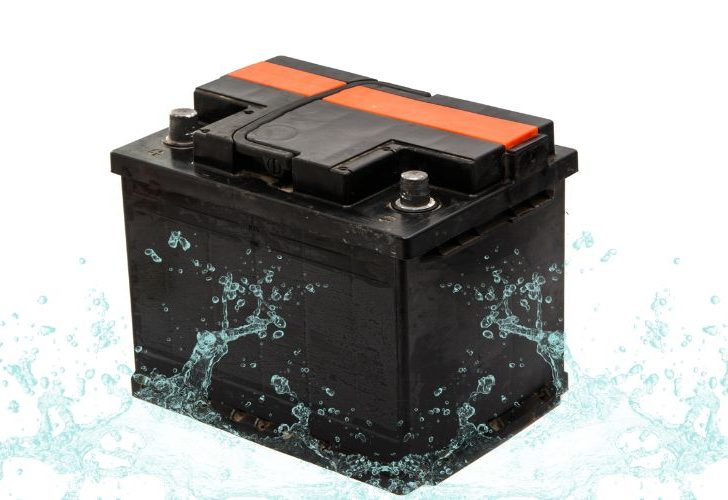When you head out on the water, you want to have confidence that your onboard batteries won’t fail you. For this reason, you’re probably using some type of marine battery for all of your boating needs.
But how much water exposure can a marine battery take? If you were to drop it into the water, would it still work?
What about if you drop it in saltwater?
Will the battery be damaged beyond repair?
Can a battery shock you when you’re trying to retrieve it from the water?
Keep reading!
In this article, we’ll answer all of these questions and more.
Table of Contents
Are Marine Batteries Waterproof?

No battery is completely waterproof, not even marine batteries.
Most of the battery’s active components are housed within a protective outer casing. Marine batteries generally have a thick, durable casing, but even this casing can be breached if the battery is damaged or submerged for too long.
The good news is that marine batteries are generally more tolerant to water than other types of batteries. They are the best choice for use on boats because it takes more force to damage their outer casing and more moisture exposure to damage the fragile components.
What Happens if a Marine Battery Gets Wet?

Marine batteries are made for outdoor use, which means they can handle some water and moisture exposure. For example, air humidity levels are often very high near bodies of water, but the humidity should not affect a quality marine battery.
In addition, any battery you have mounted on a boat will probably be subjected to occasional water exposure. Batteries may be dampened from ocean spray, splashed by waves, and even rained on.
Too much of this moisture exposure can cause a multitude of problems with the battery, especially if the water gets inside the battery’s outer casing. Water may cause the electrical system to short out, corrode some of the components, or permanently destroy them.
As noted, though, marine batteries can typically handle more moisture than other types of batteries. A small amount of spray or a few minutes of light rain should not cause too many problems as long as the battery is dried off immediately following the exposure.
If you’re expecting to be out in rough waters or heavy rain, or if you prefer leaving your battery in your boat between trips, it’s best to house it inside a battery box. The battery box will add an extra layer of protection.
Can You Use a Marine Battery that Fell in Water?
So, what if you were carrying your battery to or from the boat and it slipped out of your hands and fell into the edge of the pond or lake? Is it still usable?
That depends on several factors, most notably whether the battery is fully submerged and how long it takes to remove it from the water.
If the water wasn’t deep, you were probably able to recover the battery right away and dry it off immediately. If the water didn’t penetrate the battery casing or cause any damage to its components, you may still be able to use it.
You’ll want to make sure the battery is completely dry before you install it, however. It might also be good to use a battery tester to make sure it is still working properly.
If you drop the battery in deeper water so that it is fully submerged, you may not be able to get to it right away. It will take only a matter of seconds for water to penetrate the casing and cause irreparable damage to the inner parts of the battery.
If the water damages the battery, no amount of drying will be able to save it. What’s more, any water that penetrates the casing will be impossible to reach, so you won’t be able to dry off the battery fully.
What About Saltwater?
Saltwater is more corrosive than freshwater, so dropping your battery in saltwater may cause more damage more quickly than dropping it in freshwater.
Even if the battery is not fully submerged and you remove it immediately, residue from the saltwater may remain on the terminals, causing them to rust. Quickly rinsing the battery with freshwater may remove the residue but will increase the risk of water damage.
Marine batteries should be kept in battery boxes if you do a lot of saltwater boating. Repeated splashing with waves or sea spray will put your battery at a higher risk of failure and shorten its overall lifespan.
Can Batteries Electrocute You in Water?
Most batteries used on boats are 12V batteries. These types of batteries rarely cause any more damage than a minor shock that feels similar to static electricity.
Saltwater generally conducts electricity better than freshwater, but neither one will allow a marine battery to produce enough current to electrocute you.
Of course, if you are standing in saltwater (or even freshwater) and you grab onto both battery terminals at once, you will feel a shock. It will probably be painful and unpleasant, but it will not electrocute you.
But there are very few scenarios when you are likely to be grabbing your battery terminals while you are in the water. Your marine battery will not hurt you, for most practical purposes, even if it has gotten wet or you are touching it while wet.
Conclusion
Marine batteries should not be submerged in water, as the water can seep through the battery casing and cause internal damage. Even if the damage does not immediately cause corrosion or an electrical short, repeated heavy moisture exposure can shorten your battery’s life.
The best way to protect your marine battery is to keep it secured in a battery box. The box will hold the battery in place, reducing the risk it will break loose and fall out of the boat. It will also protect the battery from more minor exposure from sea spray, choppy waves, and rain.

Sarah Hood has been writing for Anchor Travel since 2021. When she’s not writing, she enjoys cooking, singing, and spending time in the great outdoors.

